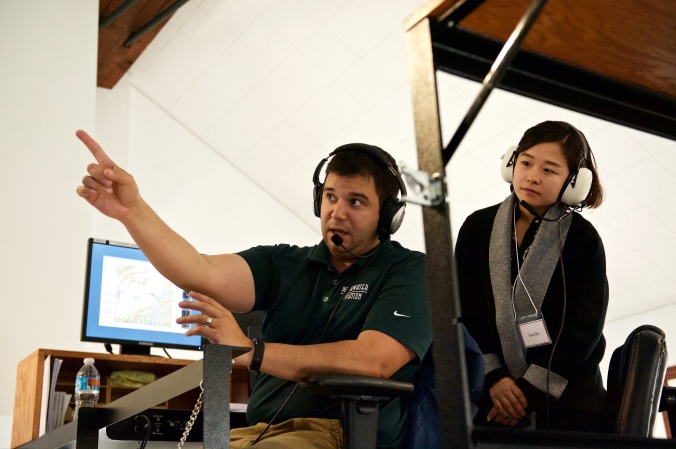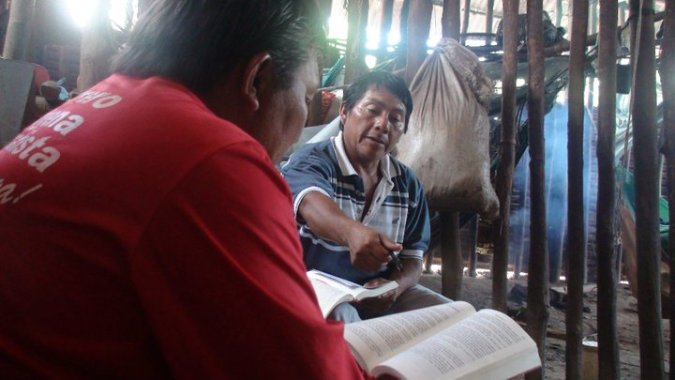By Jon Weber, Director of Development

When visitors are meeting our entire staff, we each typically take a few moments to introduce ourselves and explain our own roles. However, we mixed it up at a recent meeting and introduced the team member to our left rather than ourselves. I happened to be sitting next to Ryan Dawson. Here’s what I shared about him:
- Ryan was born in the jungles of Venezuela. He grew up eating things I’d be shocked to find in a zoo.
- Ryan currently part of Mission Padamo Aviation Services (MPAS) but is “on loan” to Spokane Turbine Center as he builds missionary aviation experience and oversees the refurbishment of a recently-purchased Cessna 206. Moody Aviation and Spokane Turbine Center are assisting with the aircraft maintenance work.
- More than anyone I know, he instructs our Spokane Turbine Center and Parkwater Aviation customers with an unmatched passion for missionary aviation. In addition to his faith, that passion is a product of his own family history.

Ryan instructs pilots for both Spokane Turbine Center and Parkwater Aviation as he prepares for serving in Venezuela. Although fluent in English, Spanish, and Yanomamo, Ryan sometimes teaches pilots via translation to yet more languages. In this simulator session, Ryan works with a Mandarin translator for Chinese Parkwater Aviation customers.
While currently upgrading MPAS’s Cessna 206 and building turbine aircraft experience, one day he’s heading back to his roots with a critical tool: an airplane capable of reaching places like his home village of Coshilowäteli (please don’t ask me to pronounce this) in southern Venezuela. His heart is for the Yanomamö people who live across the region.

Ryan Dawson’s family is committed to showing the Yanomamo people of southern Venezuela the love of Christ. An airplane will enable them to serve these people far more effectively. (Photo courtesy MPAS)
Hyperinflation, food shortages, deep recession, and government corruption dominate current headlines from Caracas. For Ryan’s remote home village, economic and political instability are only part of the challenge. Geographic isolation is another. There are no hospitals in the unforgiving jungle.
“Effective missionary aviation is personal to me,” Ryan says. “In 1992 my mom went into a malarial coma on a Sunday morning, and it was not until noon on Monday that we could establish communication for help. We were finally able to get an airplane to our village, but this was too long and she never recovered. Then in 2006, my 6-year old sister, Mikeila, became ill soon after midnight one morning. She went unconscious at 9:00 AM and passed away at 2:00 PM. We called for help the whole time but no one ever answered.”
Having witnessed preventable deaths in his own family, Ryan grew up dreaming of having an airplane available in the jungle, where it is needed most. The MPAS team believes with their whole hearts that one day God allow them to operate aircraft in Venezuela. When emergencies happen, an airplane can bring the Yanomamö badly-needed relief. It can also support missionaries to show the Yanomamö how much God loves them.
Once, missionary aviation organizations used 86 different village airstrips in Venezuela. Back then, with aviation logistic support, missionaries could more effectively serve the Yanomamö. Many deadly medical problems could be solved, as missionary aircraft could be called in to evacuate the sick or fly in medical help.

Medical flights are a way of bringing people condemned to death from sickness or injury back to life. In the same way, the Word of God brings people condemned to darkness back to life through the sacrifice of Jesus Christ. (Photo courtesy MPAS)
That changed in early 2006 when then-president Hugo Chavez forced missionary aviation organizations to withdraw from Venezuela. The government has not provided air support to local villages since, and many airstrips have been reclaimed by the jungle. Remote people are far less accessible to the missionaries who are desperate to serve them. Victims of easily treated emergencies like snake bites, pregnancy complications, and malaria are now dying regularly because there is no way to provide even simple treatments.

Without effective air support, the most effective method for reaching the Yanomomo people is with river boats. While boats can haul far more cargo and people compared with aircraft, their slow speed makes them less effective for medical help. (Photo courtesy MPAS)
Because they are Venezuelan citizens (Ryan was born there), the Dawsons can legally continue to operate Mission Padamo Aviation and Support (MPAS) in the country. MPAS’ vision is to provide cost effective air support for the national church and assist them in placing missionaries in the furthest hardest to reach areas of Amazonas state of Venezuela. Medical flights are another urgent priority.

MPAS’ Cessna 206 will soon be ready to begin operations in Venezuela. Moody Aviation and Spokane Turbine Center have served MPAS by inspecting the aircraft, helping with repairs, and installing modifications like a belly cargo pod, and additional fuel tanks.
“MPAS has tapped the invaluable expertise of the Spokane Turbine Center staff, and have networked with other mission aviation organizations through Spokane Turbine Center,” Ryan says. “While our new Cessna 206 is a great start, a larger KODIAK could easily be utilized to its maximum capacity in Venezuela. My Spokane Turbine Center experience will someday play a critical role in allowing our organization to use a turbine aircraft.”
Spokane Turbine Center needs your help to continue serving our partner organizations like MPAS. Here’s how you can become part of our team:
- Contact me and sign up for our regular electronic updates. You can also follow us on Facebook at Twitter.
- Support Spokane Turbine Center through prayer and finances. You can even direct your donations toward Ryan’s salary while at Spokane Turbine Center.
- Come visit if you’re in the Spokane area and learn more.
Here’s how you can partner with MPAS;

I am honored to work with Ryan, who grew up in a Yanomamo village like the one above. I’ve learned so much about missionary aviation through him. Join me in praying for Ryan, the Dawson family, and MPAS as they diligently serve the people of southern Venezuela. (Photo courtesy MPAS).